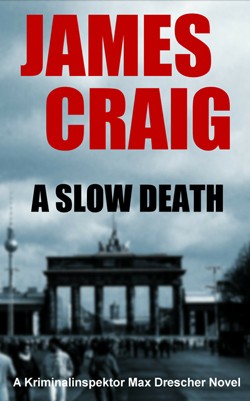It’s one of the great movie lines of all time, so there’s no shame in Kriminalinspektor Max Drescher adapting the immortal words of Lt Colonel Kilgore from Apocalypse Now. ” I love the smell of tear gas in the morning,” Drescher observes wryly after another night of student protest and violence on the streets of Berlin.
A Slow Death is set in 1990, and barely a year has elapsed since the most infamous wall of modern times began to crumble. If any of the newly-reunited Berliners thought that the fall of the Deutsche Demokratische Republik would bring health, wealth and happiness to all they are seriously disillusioned. Activists, anarchists and students are protesting but more seriously for Drescher and his sergeant, Michael Rahn, Turkish gangs are targeting late night revelers in a murderous response to the police’s apparent indifference to the death of a Turkish immigrant.
Drescher’s caseload worsens as he is called in to investigate the apparently motiveless slaughter of Carl Beerfeldt and his entire family. Beerfeldt’s only crime seems to be that he owns a nondescript bookshop, which may be a front for something more sinister. Then, an accountant is found tortured to death. When a middle-ranking cop goes to talk to the widow he is shot dead on her doorstep, and when his colleagues arrive at the scene they find the not-so-merry widow killed by the same weapon.
Drescher and Rahn are convinced that the killer is Volkan Cin, the violent son of a respectable Turkish construction boss. What is less obvious is why he is connected to Carolina Barbolini, the glamorous but psychotic daughter of a known mobster. The answer is, as always, to follow the money. There is the small matter of a missing $3 million, and the various bad-hats in the story, including a corrupt cop, are knocking each other about to find the cash.
Bit by bit, we learn more about Max Drescher. Although the emphasis is subtle it is quietly pervasive because, despite the gung-ho action, the book is all about him. He was a cop in East Germany but was offered asylum when the plane he was on came down in West Germany. Most important to his history is the fact that he is homosexual. Remember this is 1990 and AIDS was a huge issue around the world. Drescher receives the shattering news that he is HIV-positive, and although he pretends to view the news with quiet resignation, he receives a further body blow when learns that his most recent lover – a married man – has also been diagnosed and has committed suicide.
This book is a major departure for James Craig, who also writes the London-based John Carlyle series. Does the combination of a new man and a new setting work? Yes, it does.
Drescher is rough around the edges, but not unkind, and his attempts to come to terms with his death sentence are poignant but not without a macabre sense of comedy. I love the fact that James Craig trusts us, his readers. He has told us that the story is set in Berlin, so he doesn’t insult our intelligence by having his characters break into German every now and again, in case we have forgotten.
The police procedural part of the novel is thorough and pacy, but the real spotlight is on Drescher himself, and Craig handles that with compassion and perception. My only disappointment was that I was left guessing as to what did actually happen in a climactic shootout near the end of the book.
Fahrenheit Press
Kindle
£2.95
CFL Rating : 4 Stars











Oooh, I really like the sound of this – recent German history!